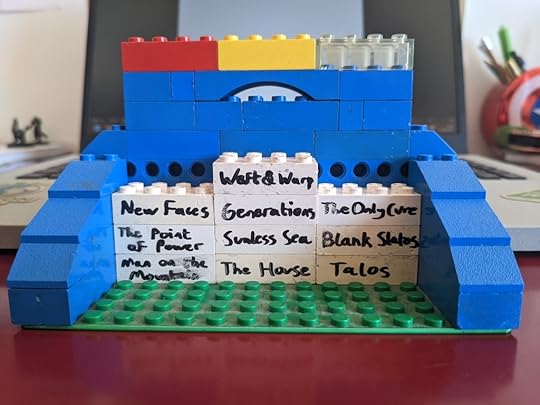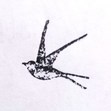Submissions
In my new life as a More Full-Time Author Than I Was Before, I’ve not just been writing. There’s much more to do than that. Apart from my dubious and ongoing efforts at sorting out publicity, and all the editing I’ve still got to do, I’ve been hard at work submitting stuff. Behold, if you will, the mighty Submissions Widget.
 Red is available, yellow’s submitted, and clear (because I didn’t have green) is accepted.
Red is available, yellow’s submitted, and clear (because I didn’t have green) is accepted.This device is just for short stories – of which I realised I have a surprising number ready to go. Many had been languishing for some time without being sent anywhere, so my first order of business was to sort that out and get as much as I could into the wind to see what stuck. As you can see from the contents of the red column, I’ve already had some rejections. But the height of the yellow column continues to give me hope. And while I haven’t had any new acceptances (the 3 in the clear column were added for morale purposes), there’s no sense getting down about it. As I’ve remarked before, the life of an author is a life of constant rejection interspersed with shining moments of acceptance and glory. Especially with short stories.
Submissions to literary agents, however, are a whole other thing. If you’ve never done one, they are essentially job applications (or at least as much effort). You’ve got a full cover letter to write, a synopsis to beat into shape, and an extract to prepare – like with short stories, of varying format and length. It would be very convenient if at the next Grand Convocation of Editors and Agents if everyone could just sit down and agree on one manuscript format and extract length to use going forward. (But obviously different recipients have different requirements, so it’s absolutely fine – just time-consuming.)
And, I’ve discovered, they’re just as nerve-wracking as job applications. With a short story it’s somewhat easier to adopt a fire-and-forget approach (emphasis on somewhat): the cover letter is shorter and the content is too, and if the editor doesn’t like it, it could be worse – it’s only a few thousand words, after all, and I’ve got plenty more in the pipe.
But a book? That’s a different beast. That’s tens of thousands of words, waiting to be read. And it’s an extract, which means you’re constantly worrying about whether the selection you’ve prepared is a good enough representation of the book as a whole. I’ve sat for hours debating over frontloading action scenes or Flashy Stuff for submission purposes even if it throws off the flow of the actual story I want to tell. It’s like flyering at the Fringe Festival – you’ve only got so long to give a pitch before the people you’ve accosted on the street manage to escape, and even if they take your piece of shiny paper there’s no guarantee they’ll do anything with it.
So you hone your pitch, or your cover letter, or your synopsis, and of course your manuscript. You get them looking as good as you possibly can. And you send them off, and it’s still mostly up to Dame Fortune whether you’ve picked the right person and whether they’ll like it.
In a long-winded way, this is my way of informing you that I’m doing agent queries again. I’ve got one out there right now. I don’t know if it’s going to land. But if it doesn’t, I’m going to keep on trying. Because eventually (hopefully), I’ll find that perfect person. And even more hopefully, they’ll actually like what I’ve written.



